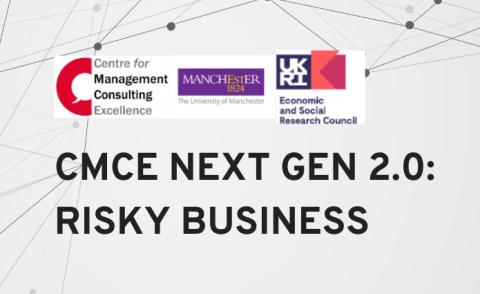CMCE Next Gen 2.0: Risky Business
This was a series of interactive workshops with leading academics and practitioners to explore the fundamentals of behavioural economics, how they can be used reflectively to change how we think about business today, and what they mean for how we engage with the future of technology. Held jointly with Dr Edmond Smith, Senior Lecturer in Economic Cultures at the University of Manchester, these sessions looked at how behaviour, emotions and social relations inform today's business dynamics. Our line-up of speakers provided different perspectives and tackled a wide range of topics including, for example, bioengineering, artificial intelligence, neuroeconomics, and conspiracy theories.
Dr Edmond Smith, main speaker and lead panellist
Dr Edmond Smith is a Senior Lecturer in Economic Cultures at The University of Manchester. Their prize-winning research seeks to understand the institutional underpinnings of economic development, innovation, and globalisation. This includes numerous academic journals and books, including Merchants: The Community That Shaped England’s Trade and Empire (2021), and prestigious funding awards from the British Academy, UKRI, and the European Research Council. In addition to their academic work, Smith maintains strong relationships with finance and policy sectors, with a particular focus on economic security, innovation, and long-run economic change. In 2023 they established the Economic Security Policy Network that draws on a wide range of expertise across the humanities to provide expert advice on topics related to innovation, technology, and systemic economic challenges.
You can find more details on the line-up of speakers here.
Please find below details on the individual sessions:
Workshop One: How Do You Make Decisions? 11 April 2024
Much of life and business comes down to making choices. But how do you make decisions? We might like to think that we carefully collect and assess information, consider the outcomes dispassionately, and reach a rational decision: but how often can that really be the case? Who hasn’t found themselves making a snap judgement based on first impressions, on gut feeling, or half-heard rumours coming down the grapevine? Rather than suggesting that this is a mistake, this session simply accepted that this is how we all reach decisions and aimed to draw out the influences that shape us.
Read the event summary and watch the video.
Workshop Two: How Does Motivation Affect Your Choices? 9 May 2024
Why does anyone do anything? Do we take risks for the possibility of reward? Or do we turn from them out of a fear of failure or punishment? There are myriad motivations that affect all of us, but recognising that they change how we make decisions is only the starting point. In exploring how diverse motivations can change how we make decisions, personally and in work, this session aimed to reach a better understanding of how different people respond to risks and opportunities, and how we might use this to make better decisions, as individuals and as businesses.
Read the event summary and watch the video.
Workshop Three: Can You Be Rational? 23 May 2024
The third session introduced another key concept from behavioural economics – bounded rationality. This is the idea that, despite our efforts to act rationally, the bounds of what we know inevitably constrain our decisions. Instead, uncertainty is part of everyday life: we cannot know everything, and even what we do know is shaped by our education, knowledge and training. Through this discussion, we gained a better understanding of the ways in which we look to understand and mitigate against risk, and to take advantage of opportunities, paying particular attention to longer term goals in life and work.
Read the event summary and watch the video.
Further reading:
Conspiracy Loops: From distrust to conspiracy to culture wars, Demos report, April 2024
Expert guide to conspiracy theories: introducing a new six-part podcast series from theconversation.com
Suspicious Minds: Why We Believe Conspiracy Theories (2015) by Rob Brotherton
The Nature of Conspiracy Theories (2020) by Michael Butter
Doppelganger. A Trip Into the Mirror World (2023) by Naomi Klein
Workshop Four: Why Do We Fear the Unknown? 13 June 2024
When we think about the future of technology – from AI to robotics to genetics – how can we possibly interpret these possibilities effectively? For some of us, our first thought might lean towards science fiction’s skull-faced Terminators or over-clever theme-park raptors, while others might simply feel overwhelmed by the scale of change underway. Some, too, will be inspired and excited by the seemingly endless possibilities that technology promises. Whatever the case, our emotional response to new technology shapes how we engage with it, as individuals and as communities, and recognising those hopes and fears is key to understanding ourselves within the world’s possible futures.
Read the event summary and watch the video.
Further reading
Psychological foundations of dynamic capabilities: reflexion and reflection in strategic management;
